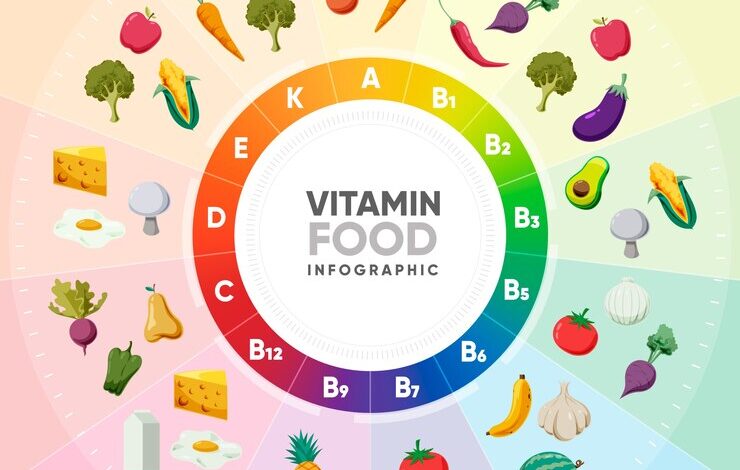The Ultimate Guide to Essential Vitamins

Vitamins are organic compounds that are essential for human health. They are required for a variety of bodily functions, including cell growth and repair, energy production, and immune function.
There are 13 essential vitamins, which are divided into two categories: fat-soluble vitamins and water-soluble vitamins.
Fat-soluble vitamins are stored in the body’s fatty tissues. They include:
- Vitamin A is essential for vision, skin health, and immune function. Good sources of vitamin A include carrots, sweet potatoes, spinach, and liver.
- Vitamin D is essential for bone health, immune function, and muscle function. Good sources of vitamin D include sunlight, oily fish, and fortified foods.
- Vitamin E is a powerful antioxidant that helps protect cells from damage. Good sources of vitamin E include nuts, seeds, and vegetable oils.
- Vitamin K is essential for blood clotting. Good sources of vitamin K include leafy green vegetables, broccoli, and Brussels sprouts.
Water-soluble vitamins are not stored in the body and must be consumed regularly. They include:
- Vitamin C is an antioxidant that helps protect cells from damage. Good sources of vitamin C include citrus fruits, berries, and broccoli.
- Thiamine is essential for energy production. Good sources of thiamine include whole grains, lean meats, and beans.
- Riboflavin is essential for energy production and red blood cell production. Good sources of riboflavin include dairy products, leafy green vegetables, and whole grains.
- Niacin is essential for energy production and nerve function. Good sources of niacin include meat, poultry, fish, and whole grains.
- Vitamin B6 is essential for energy production, brain function, and immune function. Good sources of vitamin B6 include whole grains, lean meats, and bananas.
- Folate is essential for red blood cell production and fetal development. Good sources of folate include leafy green vegetables, legumes, and citrus fruits.
- Vitamin B12 is essential for red blood cell production and nerve function. Good sources of vitamin B12 include meat, poultry, fish, and dairy products.
Demystifying Cancer: A Guide Types and Powerful Prevention Tacticshttps://unikesh.com/demystifying-cancer-a-guide-types-and-powerful-prevention-tactics/
How to get enough vitamins
The best way to get enough vitamins is to eat a healthy, balanced diet that includes a variety of fruits, vegetables, whole grains, and lean protein sources.
Here are some specific tips for getting enough vitamins:
- Aim for at least five servings of fruits and vegetables per day.
- Choose whole grains over refined grains.
- Choose lean protein sources.
If you are pregnant, breastfeeding, or have certain health conditions, talk to your doctor about whether you should take dietary supplements.
Signs and symptoms of vitamin deficiency
A deficiency in any vitamin can lead to a variety of health problems. Here are some of the signs and symptoms of vitamin deficiency:
- Fat-soluble vitamin deficiency
- Vitamin A deficiency can lead to night blindness, dry skin, and hair loss.
- Vitamin D deficiency can lead to bone pain, muscle weakness, and fatigue.
- Vitamin E deficiency can lead to muscle weakness, fatigue, and neurological problems.
- Vitamin K deficiency can lead to easy bruising and bleeding.
- Water-soluble vitamin deficiency
- Vitamin C deficiency can lead to fatigue, muscle weakness, and poor wound healing.
- Thiamine deficiency can lead to beriberi, a condition that causes fatigue, muscle weakness, and heart problems.
- Riboflavin deficiency can lead to mouth sores, skin problems, and fatigue.
- Niacin deficiency can lead to pellagra, a condition that causes diarrhea, dermatitis, and dementia.
- Vitamin B5 deficiency is rare.
- Vitamin B6 deficiency can lead to fatigue, irritability, and nerve damage.
- A biotin deficiency is rare.
- Folate deficiency can lead to anemia, birth defects, and neurological problems.
Recommended Daily Intakes (RDIs) for Vitamins :
Children
| Age | Vitamin A | Vitamin D | Vitamin E | Vitamin K |
| 1 – 3 years | 300 micrograms | 600 international units (IU) | 6 milligrams | 50 micrograms |
| 4 – 8 years | 400 micrograms | 600 IU | 7 milligrams | 75 micrograms |
| 9 – 13 years | 600 micrograms | 600 IU | 10 milligrams | 90 micrograms |
| 14 – 18 years | 700 micrograms | 600 IU | 15 milligrams | 120 micrograms |
Adults
| Age | Vitamin A | Vitamin D | Vitamin E | Vitamin K |
| 19–50 years | 900 micrograms | 600 international units (IU) | 15 milligrams | 120 micrograms |
| 51 to 70 years | 700 micrograms | 800 IU | 15 milligrams | 120 micrograms |
| 71 years and older | 700 micrograms | 800 IU | 15 milligrams | 120 micrograms |
Notes :
- RDIs are the minimum amounts that a healthy adult needs to maintain good health.
- Some people may need higher amounts of vitamins, depending on their health condition or other circumstances.
- Vitamins can be obtained through diet or dietary supplement sources
———————————————————————————————————-
Source :
- The National Academies of Sciences, Engineering, and Medicine. Dietary Reference Intakes for Vitamins and Minerals. 10th Edition. Washington, DC: The National Academies Press, 2020.
- The Office of Dietary Supplements, National Institutes of Health. Dietary Supplement Fact Sheets

